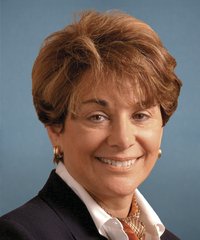
Like the Silicon Valley region she represents, Congresswoman Anna G. Eshoo exemplifies innovation. She’s creative, boundary breaking and productive. She is a problem solver and a consensus builder. In Rep. Eshoo’s two decades in Congress, she has defended consumers, promoted American competitiveness and innovation, fought for access to health care for families and children, protected the environment, and encouraged development of clean energy technology.
Rep. Eshoo’s work consistently earns the highest approval from a wide range of organizations, including the League of Conservation Voters, the Humane Society, the American Association of University Women, Iraq and Afghanistan Veterans, the Biotechnology Industry Organization, the American College of Emergency Physicians, and the Science Coalition. The San Jose Mercury News named her one of the ten most powerful women in Silicon Valley “because she sits on committees that oversee the Internet and biotech—areas vital to the valley’s interests.”
Rep. Eshoo is a longtime supporter of local transportation and transit projects that reduce traffic on our region’s overcrowded roadways, and provide more options for the traveling public and businesses. She has secured millions in federal funding to update transportation systems to reduce emissions, which is essential to combatting the climate crisis because the transportation sector accounts for 27% of all greenhouse gas emissions. Chief among these projects is the modernization of Caltrain to be more energy-efficient and convenient for commuters, and after many years this system is finally being brought into the 21st century. She has also secured federal funding for local projects to deploy electric buses, build bicycle lanes and paths, and improve bus and light rail service in the Peninsula and South Bay, which will reduce both emissions and the time commuters spend sitting in traffic.
Caltrain Electrification
Passenger rail service began on the Peninsula corridor in 1863, one year after President Lincoln signed the Pacific Railway Act to authorize track to be laid. Today, thanks to Rep. Eshoo’s advocacy, the modern generation is building something worthy of the future of our region. Rep. Eshoo led the effort in Congress to secure a $647 million federal grant for the Caltrain electrification project, and was successful in 2017.
Replacing the existing diesel trains with electric trains will have an extraordinary environmental impact, improving daily air quality on the corridor by over 97 percent and reducing annual greenhouse gases by over 176,000 metric tons of CO2 equivalent by 2040. Electric trains are less expensive to operate, quieter, cleaner, and faster than the existing diesel trains. The project will also provide improve traffic flow on one of the most congested corridors in the country by removing an estimated 619,000 daily vehicle miles off the region’s roadways. Electrification is also part of Caltrain’s broader modernization efforts which will run faster, more frequent trains to double ridership by 2040 and carry as many people as 5.5 freeway lanes of traffic every hour.
Bipartisan Infrastructure Law
The American Society of Civil Engineers recently gave the U.S. infrastructure a grade of C-. The consequences of America’s aging infrastructure are more hours spent in traffic, higher prices for goods, and slower economic growth. Pre-pandemic, Bay Area commuters wasted an average of 103 hours in traffic per year.
Rep. Eshoo was very proud to vote for the bipartisan Infrastructure Investment and Jobs Act that President Biden signed into law in November 2021. It is the single largest investment in infrastructure in our nation’s history. The new law delivers $4.5 billion to the Bay Area in guaranteed funding for roads, bridges, passenger rail and public transit, a 50 percent increase from the current allotment of federal dollars. The Bay Area will also be in a strong position to compete for more than $140 billion in federal grants for projects such as reducing traffic congestion on Highway 101; replacing diesel school buses with zero-emission ones; electrifying local bus fleets; and building grade separations at Caltrain crossings to improve safety and traffic flow.
Beyond improving travel for commuters, the new law invests in our nation’s seaports, airports, and freight rail to alleviate bottlenecks and relieve supply chain pressures that drive inflation. The law also invests $65 billion in broadband infrastructure and helps meet America’s climate goals by modernizing the electric grid to facilitate the expansion of renewable energy and by building out a nationwide electric vehicle charging network to encourage the adoption of cleaner cars.
Lastly, the new law addresses California’s unique challenges as the state faces a significant drought. It provides $8.3 billion for water storage, recycling, and desalination in western states to increase the water supply and prepare for future dry years. The law also includes resources to protect homes against wildfires and prevent fires before they start by burying powerlines and better managing forests.